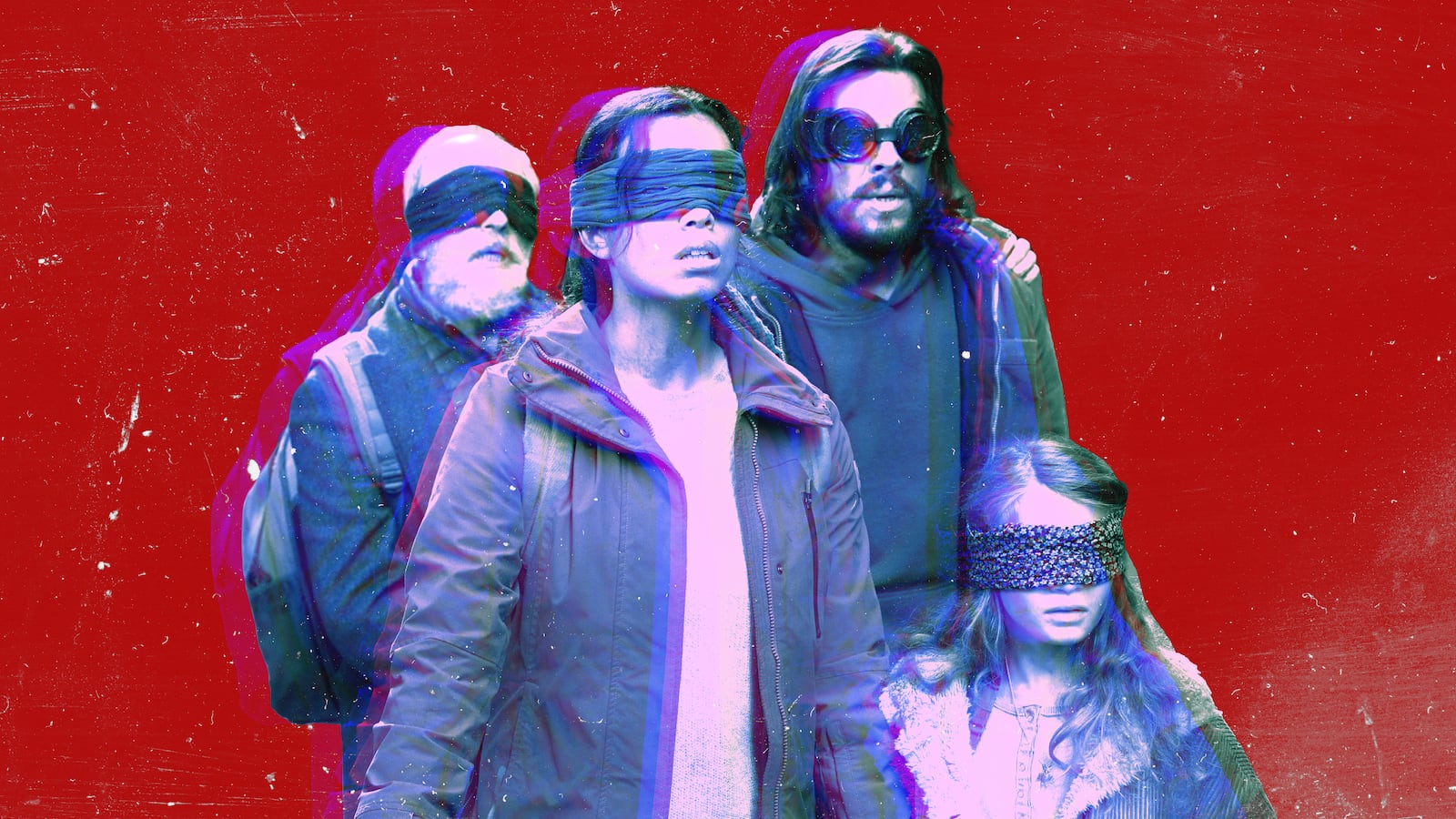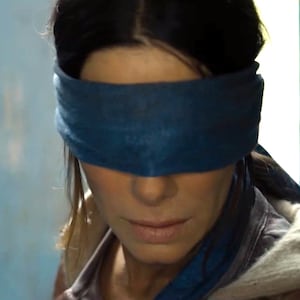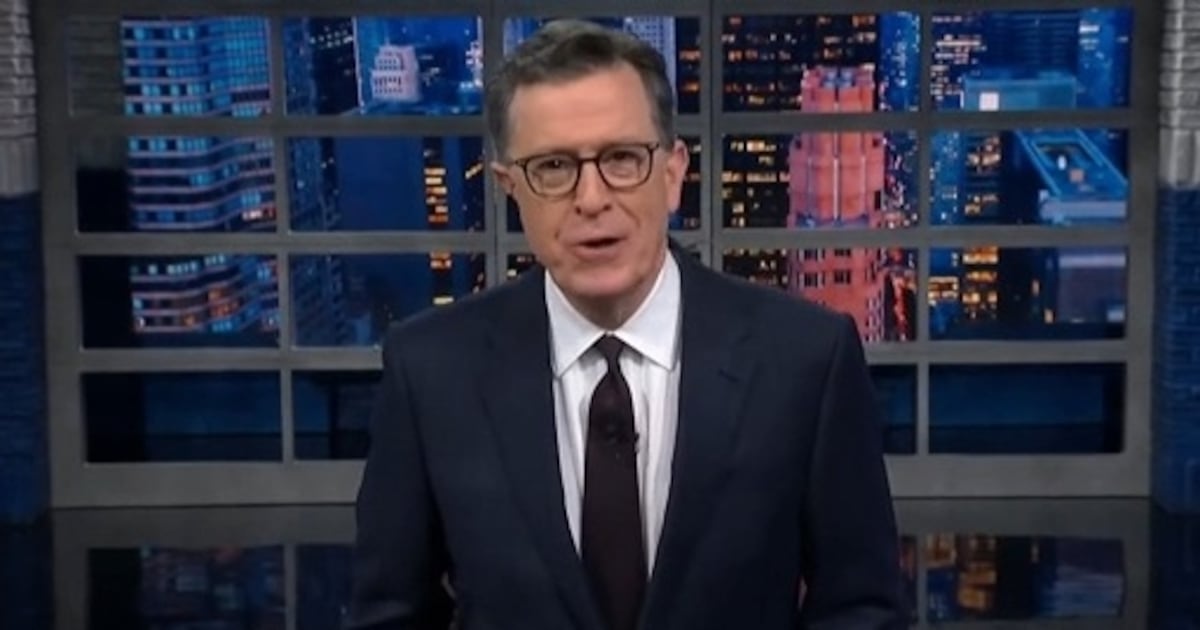According to Netflix, Sandra Bullock’s thoroughly mediocre 2018 thriller Bird Box (based on the novel by Josh Malerman) was watched by more people in its first 28 days of release than any of its other original films. As baffling as those statistics might be, they’re inarguably the reason for Bird Box Barcelona, which premieres July 14. It’s a spin-off with far fewer stars but the same basic premise, involving a group of men and women trying to navigate a world overrun by invisible entities that compel anyone who sees them to commit suicide.
In most respects, it’s a generic trip through a wasteland of evil creatures and equally malevolent men. Yet thanks to a couple of novel twists, it manages to outpace its predecessor in tension and originality—if not quite reinvigorate the franchise.
Per its title, Bird Box Barcelona takes place in Spain, where Sebastián (Mario Casas) and his daughter Anna (Alejandra Howard) find a brief respite from the outside world—where they must remain perpetually blindfolded, lest they gaze upon the enigmatic beings that have ravaged mankind—by skating around an abandoned roller rink. When they’re subsequently beset by a trio of blind thieves, Anna convinces her dad not to retaliate by killing them. Instead, they head to the bright, sunshiny metropolitan streets, which are littered with trash, overturned cars, and rubble like every other gone-to-seed city seen in the past 40 years’ worth of post-apocalyptic fiction.
(Warning: Minor spoilers follow.)
No sooner have they begun navigating this spoiled milieu than Sebastián and Anna (who wear aviator goggles to shield their eyes from unholy sights) come upon a trio of blindfolded travelers. Relaying that he was an engineer in the before-times and that he has access to a generator that can provide heat and light, the single father convinces these wary explorers to let him join them at their bus depot refuge. Sebastián’s claim sounds dubious from the get-go, yet that’s overshadowed by his concurrent assertion that he’s alone.
It’s not long before Bird Box Barcelona reveals his statement to be true; the Anna with whom Sebastián travels is either a ghost or a figment of his grief-stricken imagination. Either way, she’s his ever-present companion, and clearly one with a modus operandi, which is confirmed when, after staying with these stragglers, Sebastián steals the keys to the bus in which they all sleep and drives them out into the sunlight, where they witness the entities and swiftly off themselves.
Sebastián, it seems, is a member of a group of fanatics led by a zealous priest (Leonardo Sbaraglia) who believes that the violence-instigating visitors are angels, and who marks his “victims” with a charcoal eye on their foreheads. Anna is cajoling Sebastián to bring salvation to humanity by forcing it to stare into the faces of the divine entities, and Bird Box Barcelona suggests that this may be really happening, considering that upon completing his work, Sebastián observes the dead’s “light” leaving their bodies and traveling upwards toward heaven. As such, the film flips its ancestor’s script, fixating on a man who fancies himself blessed by vision and is eager to share his miracle with others—no matter that it means a quick and brutal end to their mortal lives.
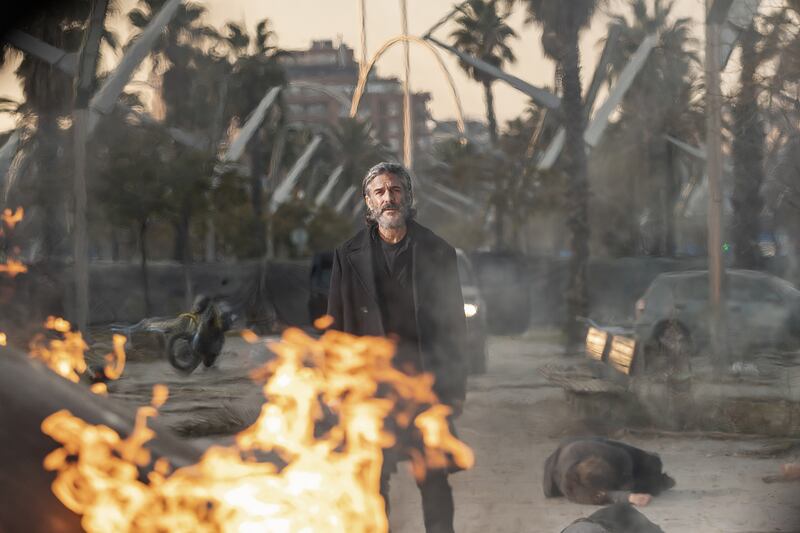
Sebastián carries out his mission at the urging of Anna, who promises that his success will lead to the family reunion he covets, and flashbacks detail the initial outbreak of mass suicides that tore apart their clan and society. This is all rather routine end-times chaos, albeit well-orchestrated by writers/directors Álex and David Pastor (Carriers), who stage their screamy and explosive bedlam with a sure hand. Their steady stewardship extends to a later set piece in the middle of a Barcelona intersection, during which Sebastián—having joined up with a group of survivors living in a WWII bomb shelter, including English psychiatrist Claire (Georgina Campbell) and adolescent German girl Sofia (Naila Schuberth)—attempts to set additional blindfolded individuals free under the direction of his spectral daughter.
The entities may be imperceptible but their arrival is heralded by whooshing and whispering, as well as leaves, gravel and other ground debris floating into the air, and the directors provide at least a couple of tantalizing shots from their wonky POV. More malicious still, they manipulate people into killing themselves by speaking in the voices of their loved ones—an act of preying upon loss that’s central to the film. Via Sebastián, Bird Box Barcelona investigates the thin line between faith and delusion, the latter brought about by crushing trauma that warps the senses. And during its middle section, it plays a delicate and largely effective game of casting its protagonist as a nominal villain who actually might be clued into the real nature of this global calamity.
That line-straddling, however, doesn’t last, thanks to the increasingly obvious fact that Claire and Sofia are surrogate wife-daughter replacements for Sebastián, with the girl destined to even wear Anna’s twinkling-angel necklace charm.
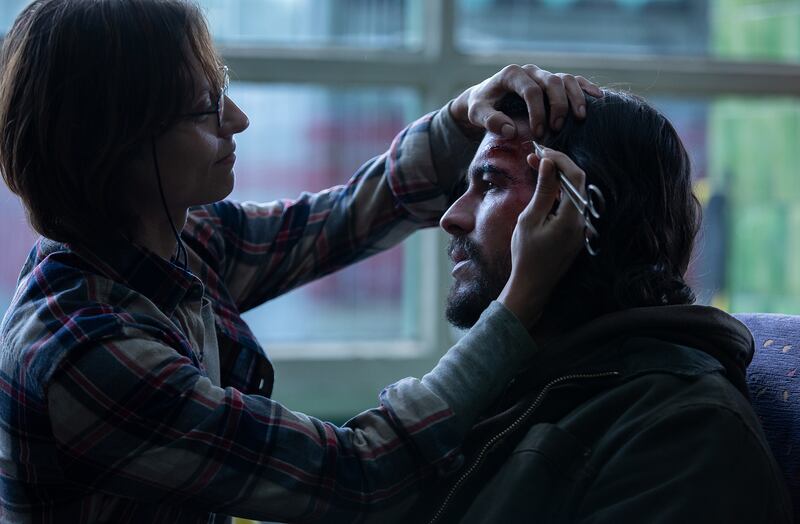
Bird Box Barcelona teases a more interesting angle for its mythology, only to resort to safe and comfortable bombshells and conflict resolutions, causing its intrigue to wane at the precise moment when it could have bloomed into something unexpected. Casas, Campbell, and Schuberth all capably handle their duties but their characters become less interesting as the proceedings progress and the mystery of this phenomenon dwindles. The narrative’s second half has Sebastián and company journeying across Barcelona in order to reach gondolas that will take them to a remote castle that Sofia’s mother said was a sanctuary, and that trek is as pedestrian as the final showdown is predictable, with noble hearts and sacrificial gestures wrapping things up in a clichéd bow.
Considering its central twist, Bird Box Barcelona’s decision to fall back on genre conventions proves deflating. Still, it’s not a fatal flaw for a follow-up that at least tries, for a time, to do something unique with material that never felt very rich to begin with. A coda lays the groundwork for possible future franchise installments in a Day of the Dead-ish vein, and on the basis of this sequel, those might be warranted—provided they take fuller advantage of the potential hinted at by this uneven saga.
Liked this review? Sign up to get our weekly See Skip newsletter every Tuesday and find out what new shows and movies are worth watching, and which aren’t.

